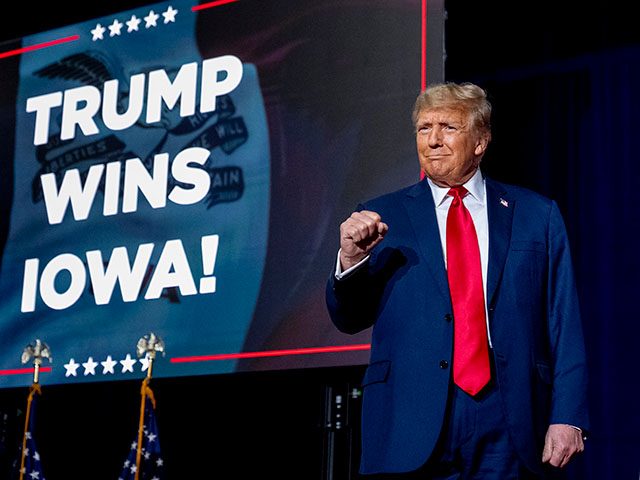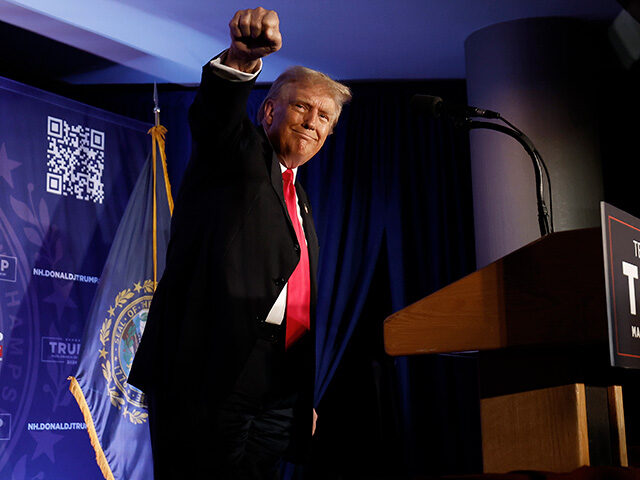Former President Donald Trump did not “engage in insurrection,” nor is he an “officer of the United States” as defined in the U.S. Constitution, a U.S. Supreme Court brief filed this week on behalf the former president argues.
The brief is in relation to the Colorado Supreme Court’s controversial ruling, in which it concluded in its 4-3 decision that Trump is disqualified from appearing on the Colorado Republican presidential primary ballot under Section Three of the Fourteenth Amendment, colloquially known as the “Insurrection Clause.”
WATCH — Sen. Graham: Trump Will Be on the Ballot in Colorado, “He Will Win the Primary”:
“The court found by clear and convincing evidence that President Trump engaged in insurrection as those terms are used in Section Three” of the Fourteenth Amendment, the ruling reads in part.
Ultimately, Trump’s brief concluded that “the judgment of the Colorado Supreme Court should be reversed,” hinging on three main points, all of which undermine the Colorado Supreme Court’s ruling.
First, Trump’s lawyers contend that Trump is not technically an “Officer of the United States” as written in Section Three of the Fourteenth Amendment.

Republican presidential candidate former President Donald Trump takes the stage at a caucus night party in Des Moines, Iowa, on January 15, 2024. (AP Photo/Andrew Harnik)
“Section 3’s disqualification can apply only to those who have ‘previously taken an oath, as a member of Congress, or as an officer of the United States, or as a member of any State legislature, or as an executive or judicial officer of any State, to support the Constitution of the United States,'” the brief reads.
“It is undisputed that President Trump never took such an oath as a member of Congress, as a state legislator, or as a state executive or judicial officer. So section 3 cannot apply to President Trump unless the president qualifies as an ‘officer of the United States’ within the meaning of the Constitution,” it continues, arguing that the “Constitution’s text and structure make clear that the president is not an ‘officer of the United States.'”
WATCH — Bill Barr: SCOTUS Will “Slap” Down Colorado Disqualification Decision:
“This phrase ‘officer of the United States’ appears in three constitutional provisions apart from section 3, and each time the president is excluded,” the brief reads.
Further, the brief argues that Trump did not “engage in insurrection,” either:
The Court should also reverse because nothing that President Trump did in response to the 2020 election or on January 6, 2021, even remotely qualifies as “insurrection.” No prosecutor has attempted to charge President Trump with insurrection under 28 U.S.C. § 2383 in the three years since January 6, 2021, despite the relentless and ongoing investigations of President Trump. And for good reason: President Trump’s words that day called for peaceful and patriotic protest and respect for law and order.
…
Finally, President Trump’s speech at the Ellipse and his post-election tweets and statements do not remotely constitute “incitement” under Brandenburg v. Ohio, 395 U.S. 444 (1969). President Trump’s statements cannot be punished under Brandenburg unless they were “directed to inciting or producing imminent lawless action” and “likely to incite or produce such action.” The Brandenburg standard does not turn on whether violence actually occurs in response to a person’s speech. It only matters whether the speech itself was “intended” and “likely” to incite imminent violence, and the constitutional status of President Trump’s statements would be no different if he had given the same speech and his supporters remained entirely peaceful as he urged. This Court would never tolerate criminal prosecution of a speaker who tells his audience to “fight like hell” and “take back our country,” as language and rhetoric of this sort is common in political discourse. Because President Trump did not “incite violence” under Brandenburg, it follows per se that he did not “engage in insurrection” either.
WATCH — Kasich: Colorado Disqualification Decision “Pure Partisan Ridiculous Stuff”:
Finally, the brief argues that Section 3, if applicable, should only be enforced via Congress’s “chosen methods of enforcement” — not a court.
“The text of section 3 does not confer enforcement authority on state courts or state officials, and it does not specify a process for determining whether an individual has ‘engaged in insurrection’ and disqualified himself from holding an enumerated office,” the brief reads, noting that the Fourteenth Amendment “empowers Congress to ‘enforce’ section 3 with ‘appropriate legislation.'”
The Supreme Court will hear oral arguments on this case on February 8.
The case is Trump v. Anderson, No. 23-719, in the Supreme Court of the United States.

COMMENTS
Please let us know if you're having issues with commenting.